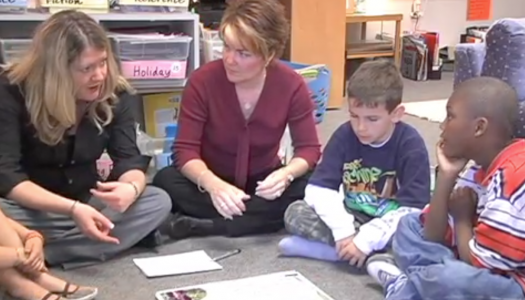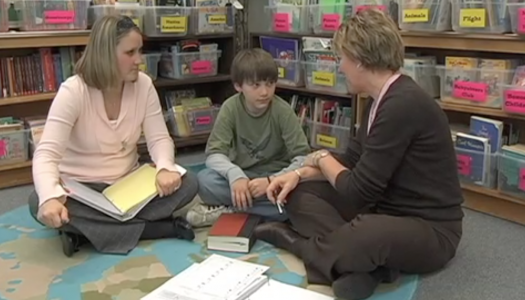Tune In to Interesting Words During Read Alouds
There is a strong correlation between reading comprehension and vocabulary knowledge. We know that students who are consistently expanding their word knowledge in elementary school will be more successful in high school, and voracious readers naturally acquire a lot of their vocabulary through their self-selected reading.

We can boost readers’ vocabularies with direct instruction, which is especially beneficial for beginning students and those learning English. However, encouraging wide reading will likely be responsible for the greatest vocabulary growth. It’s why we are so passionate about providing students with time to read every single day, why we give them freedom of choice when selecting good-fit books, and why we teach students at every grade level how to Tune In to Interesting Words.
It might sound something like this:
“I want to talk to you today about finding, remembering, and using new and interesting words, because expanding our vocabularies is one of the best ways to increase our comprehension.”
Select a great picture book that is engaging and appropriate for your grade level. Stop once or twice as you read it aloud to comment on a word that piqued your interest.
Here are a few examples of how easily and quickly you can weave this into a read-aloud.
From Cook-a-Doodle-Doo! by Janet Stevens and Susan Stevens Crummel:
“‘Then we’re a team,’” declared Rooster.”
“Declared? What a great word. It feels so much bigger than said. I might use this today when I write my story about school . . . something like, At 10:15, Mrs. Sabo declared, ‘It is time for recess.’”
From Peggy: A Brave Chicken on a Big Adventure by Anna Walker:
“One blustery day, a big gust of wind swept down through the clouds, scooping up leaves, twigs, and . . .”
“Blustery, and gust! It has been so windy here lately. I want to tuck those words into my brain. Last time I crossed the Narrows Bridge, the wind was so blustery that a gust moved my car a little bit!”
From Junkyard Wonders by Patricia Polacco:
“The day came when we were to present our stupendous projects.”
“Stupendous? What a great word. It must mean that these projects are amazing. Hmm. I want to keep this word for later so I can remember to use it. Maybe I can compliment you with this word. ‘Class, your transition from our last Daily 5 round to our focus lesson was stupendous.’”
From Boot & Shoe by Marla Frazee:
“Boot decided to station himself on the front porch and wait there until Shoe found his way back.”
“Station himself? I love that idea. I would like to station myself on the couch with the book I am reading right now because I am at a very exciting part.”
From Goldilocks and the Three Dinosaurs by Mo Willems:
“Sure enough, five minutes later a poorly supervised little girl named Goldilocks came traipsing along.”
“Traipsing!? It means she walked kind of casually, carelessly. I might use that word next time I am waiting for some of you to come in from recess. ‘You need to stop traipsing and come back quickly so we can get started on our next lesson.’”
Add Tune In to Interesting Words on the CAFE Menu under the Expand Vocabulary heading.
“Tuning in to interesting words just means being on the lookout for the amazing and thoughtful words that authors use. Authors really think about and choose their words carefully. If we can learn those words and use them in our own speaking and writing, they become our words, too.”
“Class, as you read today and from now on, pay attention to the words that pique your interest. Try them out when you talk to me, to your friends, to your family. Try them out when you write. It is a guaranteed way to make you smarter and to improve comprehension. Best of all, it really is fun.”
Enthusiasm and excitement about noticing words is highly contagious, and as students try words out in their speaking and writing, we pause to celebrate the joyous adventure of expanding our vocabularies.







